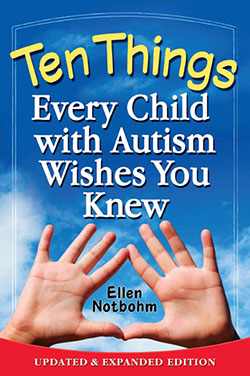Catholics called to understand, welcome to Church those with autism spectrum disorder
Criterion staff report
 With April marking Autism Awareness month, the National Catholic Partnership on Disability (NCPD) is calling on parishes and dioceses to emphasize awareness of those with an autism spectrum disorder (ASD), and to welcome them into the life of the Church.
With April marking Autism Awareness month, the National Catholic Partnership on Disability (NCPD) is calling on parishes and dioceses to emphasize awareness of those with an autism spectrum disorder (ASD), and to welcome them into the life of the Church.
In response to that call, St. Simon the Apostle Parish, 8155 Oaklandon Road in Indianapolis, will have information on ASD available after the 8, 9:15 and 11 a.m. Masses on April 21. Kara Favata, archdiocesan assistant director for special religious education, and St. Simon the Apostle member Patty Reed, president of Answers for Autism, will be available to answer questions.
According to the Centers for Disease Control and Prevention, autism spectrum disorder is “a set of complex neurodevelopment disorders that include autistic disorder, Asperger disorder and pervasive developmental disorders not otherwise specified. Children who have ASD display mild to severe impairments in social interaction and communication, along with restricted, repetitive and stereotyped patterns of behaviors, interests and activities.”
NCPD states that the national rate of incidence of children with ASD has increased from one in 150 in 2002 to one in 50 in 2013.
To help Catholics understand children in their parish who have ASD, NCPD summarizes the main points of Ellen Notbohm’s book, Ten Things Every Child with Autism Wishes You Knew.
-
I am a child. My autism is part of who I am, not all of who I am.
-
My senses are out of sync. This means that ordinary sights, sounds, smells, tastes, and touches that you may not even notice can be downright painful for me.
-
Distinguish between won’t (I choose not to) and can’t (I am not able to). It isn’t that I don’t listen to instructions. It’s that I can’t understand you.
-
I’m a concrete thinker. I interpret language literally. Idioms, puns, nuances, inferences, metaphors, allusions and sarcasm are lost on me.
-
Listen to all the ways I’m trying to communicate. It’s hard for me to tell you what I need when I don’t have a way to describe my feelings.
-
Picture this! I’m visually oriented. Show me how to do something rather than just telling me. And be prepared to show me many times. Lots of patient practice helps me learn.
-
Focus and build on what I can do rather than what I can’t do. Like any person, I can’t learn in an environment where I’m constantly made to feel that I’m not good enough and that I need fixing.
-
Help me with social interactions. Teach me how to play with others. Encourage other children to invite me to play along. I might be delighted to be included.
-
Identify what triggers my meltdowns. Meltdowns and blow-ups are more horrid for me than they are for you. They occur because one or more of my senses has gone into overload, or because I’ve been pushed past the limit of my social abilities.
-
Love me unconditionally. I didn’t choose to have autism. Remember that it’s happening to me, not you. Without your support, my chances of growing up to be successful and independent are slim. With your support and guidance, the possibilities are broader than you might think.
-
Three words we both need to live by: Patience. Patience. Patience.
-
View my autism as a different ability rather than a disability.
-
Look past what you may see as limitations and see my strengths.
-
Be my advocate, be my guide, love me for who I am.
(For information about resources and services available for Catholics of all ages with ASD or other special needs, contact Kara Favata, archdiocesan assistant director for special religious education, at 317-236-1448, or e-mail her at kfavata@archindy.org.) †
 With April marking Autism Awareness month, the National Catholic Partnership on Disability (NCPD) is calling on parishes and dioceses to emphasize awareness of those with an autism spectrum disorder (ASD), and to welcome them into the life of the Church.
With April marking Autism Awareness month, the National Catholic Partnership on Disability (NCPD) is calling on parishes and dioceses to emphasize awareness of those with an autism spectrum disorder (ASD), and to welcome them into the life of the Church.